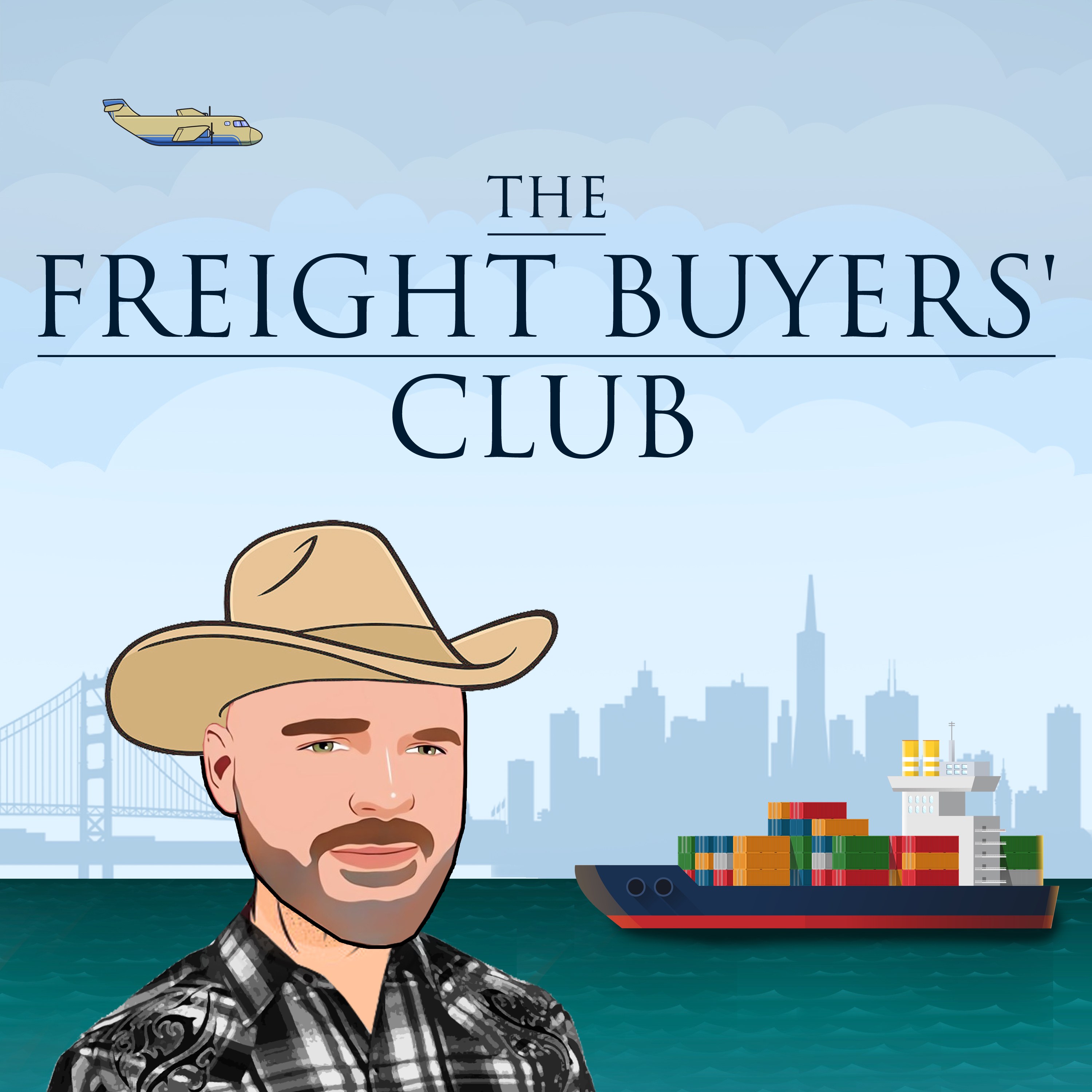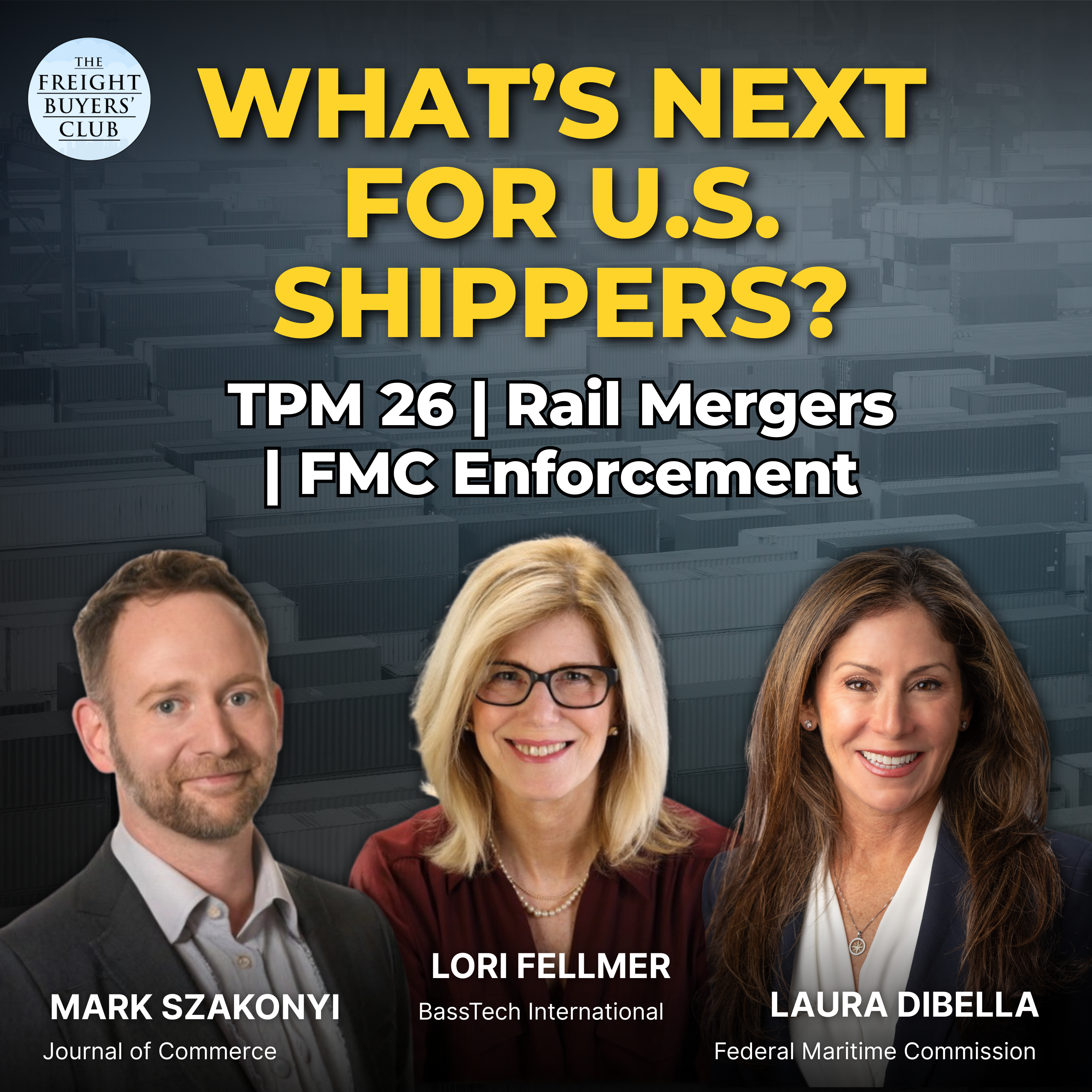Episode Transcript
[00:00:11] Speaker A: Welcome to the Freight Buyers Club. This powerful interview with an SME shipper in the US first aired in episode 48 and is brought to you with the support of Dimerco Express Group. If you find it valuable, don't forget to subscribe and follow us for more insights from the front lines of global freight.
And now someone living this every day. Susan Williams runs Callaloo, Inc. A longtime SME importer. Susan, just tell us briefly about your business and particularly focusing on how have you and your customers been affected by tariff policy this year?
[00:00:45] Speaker B: Yes. Thank you, Mike. Thank you for having me.
On average, Callaloo brought in 400 containers a year due to extenuating circumstances and tariffs being a major part of it. We've seen our containers drop drastically from the average of 400 a year. 2024 saw us bring in 23840 foot containers so far in the year. This year, the first six months, we've brought in 107 containers. You had asked me where we bring in our containers and I import out of seven countries, Haiti, Honduras, Colombia, India, Indonesia, Philippines, and of course China.
And where do they go? The containers, once they cross the ocean land in U.S. ports, they end up in my warehouse in Jackson, Mississippi.
How have the tariffs affected me? Well, the exact number of tariffs that we paid in the year of 2024 was $435,000.
So far in the first six months of 2025, we have surpassed that number to $445,000.
Now, if trade talks don't deliver and the trend continues, I'm slated to pay by the end of this year, 2025, 800, 900, possibly a million dollars in tariffs.
[00:02:17] Speaker A: I mean, they're big numbers for any business. You're actually a Trump supporter. Are you disappointed in how tariff and trade policy is affecting companies like your own?
[00:02:28] Speaker B: Yes, I am a big, I'm a Trump supporter. And yes, I'm disappointed. But I think a better word might be frustrated because the speed at which these tariffs happened was so fast none of us had time to react. And also the broad sweeping strokes of the tariffs which sucked us all in and all product lines in when so many of us, the products that we bring in cannot be made in the United States.
However, we're still paying tariffs disproportionately, I believe.
So frustration is the word I would use with the tariffs.
I think the tariffs were not intended for my industry, which is the home, accessory and decor holiday type company. They were meant for the automobile industry, pharmaceuticals, energy, big tech. These are the companies in the US that were importing a lot more than they were exporting, creating the giant trade deficit that the US Was experiencing. So I know that we were not the target of these tariffs. That's why it's so frustrating. Am I still a Trump supporter? Yes. And why is that? Trump is right. He's right in his theory to try to balance out the trade with the rest of the countries of the world.
So I get it and I see, I understand where he's coming from. But those of us in my industry who are experiencing such large tariffs, it is not sustainable.
However, I have a solution.
[00:04:19] Speaker A: Please tell us what that solution is, Susan.
[00:04:22] Speaker B: Yes, the employee profit share tax credit. And what this is in simple terms is if you are an import company in my industry where you cannot make your products in any other country, you would offer your employees 10% of your net profits. And if you do that, you will receive 90% of your tariff money back at the end of the year.
Now, the plan is so simple that it's kind of hard to wrap your mind around it. But how would this work?
At the end of the year, the tariff monies that we have paid has remained in the treasury for a solid year. The treasury has made interest on it.
The government will see that my company paid 10% of my net profits to my employees.
Therefore my employees go out into the economy and spend it. It is a win win for everybody. The tariffs stay in place as they are.
Tariffs are a complicated process. They go up one day, down the next day. It's hit with this country, hit with that country.
They're very complicated.
Our bill of ladings read like a science project when they come in because sometimes you're tariffed on aluminum, sometimes you're tariffed on glass.
A percentage of this product may be part of iron, so you're only taxed on that part. So it's very complicated. But my plan is simple because it's at the end of the year, you see the total amount of tariffs that you paid. And that is so easily accessible on the U.S. customs website, you can see how much tariffs you paid at the end of the year, you don't have to be involved with all the intricacies of how those tariffs came about.
You just see the grand total.
Then when I prove to the government that I gave 10% of my net profits to my employees through payroll reports, I should receive 90% of my tariff money back because I gave my profits to my employees to go out to the economy and spend it. So imagine the power that has. If all the companies in my industry is large. It's tens of thousands of companies strong.
We employ millions of people.
Imagine if all of us gave 10% of our net profits to our employees and they went out into the economy and spent it. That is a recipe for runaway economic growth.
And companies like me that do that should be rewarded for that.
It's a win win, like I said, for everybody. It's a win for Trump. He gets to keep his tariffs in place, using them as a tool to negotiate his agreements with countries around the world. It's a win win for our employees who get big checks at the end of the year. It's a win win for us, the U.S. american company.
And of course, more importantly, it is a giant win for our economy.
[00:07:36] Speaker A: Susan? Yeah. I've got so much sympathy for you for dealing with these higher bills, but I think what you're doing here is probably indicative of why the US Economy has been so successful for so many years, because not only are you frustrated, you're actually doing something about it. And I wish you all the best of luck in the world with that.
What sort of progress have you made or what sort of support have you garnered so far in pushing this, this solution?
[00:08:04] Speaker B: So I have, I have talked and emailed everybody that I can think of that is in my industry and the government, people involved with tariffs. I began with my industry heads. I've spoken with CEOs of companies like mine so they can get the word out to their government officials, their senators and congressmen. I have spoken with journalists. One of my greatest accomplishments thus far is that I emailed Stephen Moore. I don't know if you know who he is, but Stephen Moore was a head economist during Trump's first term, and today he is a big supporter at Paris.
[00:08:51] Speaker A: Yes.
[00:08:52] Speaker B: Yeah, he's a major contributor on a business channel in the US I emailed him. I was listening to him on TV one day and I emailed him and I told him about my plan.
Ten minutes later, he emailed me back Stephen Moore and said, sue, this is a great idea. I'm forwarding it to the Treasury.
So I'm super excited about that. Obviously, I've emailed my plan and my, my catalog. I've introduced myself to the Treasury. Where that ends up, I don't know. I'm sure they receive fund thousands of mail and information a day, and I'm, I probably am getting lost in the shuffle, but I push and push. Every day. I sit in front of the TV and, and watch business channels with a notepad and I write people's names down that mention the word tariff and I email them.
[00:09:45] Speaker A: I and Susan, what can other people do if they support your your aims?
[00:09:51] Speaker B: So what people can do in my industry is contact their senators and their congressmen, see if they can get anywhere. I had great success with finally reaching one of my senators, Cindy Hyde Smith, our Senator from the great state of Mississippi. That's where my company is located. I employ 100 hardworking Mississippians and she was very interested in how we keep these people employed. They receive healthcare, they receive 401k and yes, they receive profit sharing. I've already been sharing profits with my employees for two decades.
So when I explained that to her, she wants to help Mississippians.
So I had a great 30 minute conversation with her on the phone and when she said to me we need Scott Bessant in this meeting and of course Scott Bessant is the Secretary of the treasury for the United States, well my heart skipped a beat. I said to her if we could do that, that is my end goal.
If somebody could get me in front of Scott Besant so I could explain this plan. I am sure Trump would love this because it helps us, the American company.
[00:11:07] Speaker A: And I'm sure if you get that opportunity, you'll put your views and your plans forward in a clear and forthright manner very much as you have done today. And I w you all the best of luck with it. Susan Williams thanks for your insight and.
[00:11:20] Speaker B: And thank you Mike so much for having me on your podcast. I saw you, I did some investigation on podcast and saw you and I thought this is a podcast I need to be on and you replied to me almost immediately and invited me to be here. I thank you. This is another leg up for me and I hope something comes of it.
[00:11:43] Speaker A: You're. You're very welcome. All the best.
[00:11:45] Speaker B: Thank you Mike.
[00:11:47] Speaker A: Thanks for listening to the Freight Buyers Club supported by Demeco Express Group. If you enjoyed this conversation, please follow, Share or leave a review it helps us keep bringing you more voices that matter in global trade and logistics.


